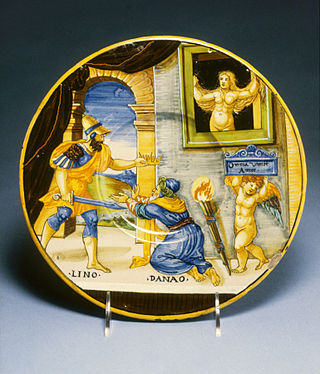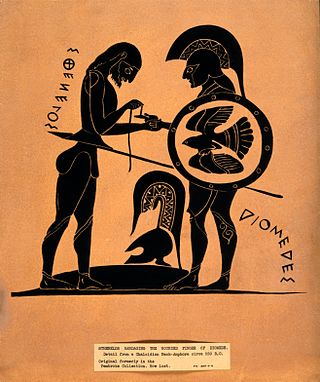Further reading
- Felix J., "Die Attische Königsliste," Klio 3 (1902), 406–439.
Before the establishment of a democracy, the Ancient Greek city-state of Argos was ruled by kings. Most of them are probably mythical or only semi-historical. This list is based on that largely given by Eusebius of Caesarea.
An alternative version supplied by Tatian of the original 17 consecutive kings of Argos includes Apis and Argios between Argos and Triopas.
Inachos, the supposed son of Oceanos and Tethys, is affirmed to have been the founder of this kingdom. He married his sister Melissa, by whom he had two sons, Phoroneus and Aegialeus: he is supposed to be the father of Io, and therefore the Greeks are sometimes called "Inachoi" after him (see also the names of the Greeks).
Argos named the kingdom after himself.
Lynceus means "lynx-eyed".
After the death of Temenos, the royal prerogative began to decrease. To Cisos succeeded Lacidamos, who had little else than the title of king. His son Meltas, impatient of such restraint, endeavored, when it was too late, to restore it to its ancient dignity; but the people were by that time so powerful that, as soon as they discovered his plan, they ended the royal power, converted the government to a democracy, and condemned Meltas to death. [7]
After Meltas, the kingship survived into historical times but rarely had any political power, one exception being the tyrant king Pheidon.
This is the king after the heraaclids fell out.

In Greek mythology, Io was one of the mortal lovers of Zeus. An Argive princess, she was an ancestor of many kings and heroes, such as Perseus, Cadmus, Heracles, Minos, Lynceus, Cepheus, and Danaus. The astronomer Simon Marius named a moon of Jupiter after Io in 1614.

Argos is a city and former municipality in Argolis, Peloponnese, Greece and is one of the oldest continuously inhabited cities in the world, and one of the oldest in Europe. It is the largest city in Argolis and a major center in the same prefecture, having nearly twice the population of the prefectural capital, Nafplio.

In Greek mythology, Danaus was the king of Libya. His myth is a foundation legend of Argos, one of the foremost Mycenaean cities of the Peloponnesus. In Homer's Iliad, "Danaans" and "Argives" commonly designate the Greek forces opposed to the Trojans.

In Greek mythology, Lynceus was a king of Argos, succeeding Danaus on the throne.

In Greek mythology, Inachus,Inachos or Inakhos was the first king of Argos after whom a river was called Inachus River, that drains the western margin of the Argive plain.

In Greek mythology, Phoroneus was a culture-hero of the Argolid, fire-bringer, law giver, and primordial king of Argos.
In Greek mythology, Pelasgus was the eponymous ancestor of the Pelasgians, the mythical inhabitants of Greece who established the worship of the Dodonaean Zeus, Hephaestus, the Cabeiri, and other divinities. In the different parts of the country once occupied by Pelasgians, there existed different traditions as to the origin and connection of Pelasgus. Some ancient Greeks believed that he was the first man.

In Greek mythology, Temenus was a son of Aristomachus and brother of Cresphontes and Aristodemus.
In Greek mythology, Anaxagoras was a king of Argos. He was the son and successor of either King Megapenthes or by the latter's son, King Argeus.
In Greek mythology, Messene was the daughter of Triopas, king of Argos. She was married to Polycaon, son of king Lelex, of Laconia.
Alector refers to more than one person in classical mythology and history:
Cylarabes, or Cylarabos, or Cylasabos, son of Sthenelus, was a mythological king of Argos.
Aegialeus also Aegealeus, or Egialeus, in classical Greek semi-mythical historiography was considered the original settler of the Peloponnese and the founder and first ruler of the city-state of Aegialea, later known to history as Sicyon.
Aegialeus also Aegealeus, Aigialeus, Egialeus, was the elder son of Adrastus, a king of Argos, and either Amphithea or Demonassa.
In Greek mythology, Iasus or Iasius was a king of Argos.
In Greek mythology, Triopas or Triops was the seventh king of Argos. Triopas may be an aspect of the Argive Zeus, or may be his human representative.
In Greek mythology, Mycene, was a daughter of Inachus, king of Argos and wife of Arestor. Mycene was said to be the eponym of Mycenae.
In Greek mythology, Proetus, the son of Abas, was a king of Argos and Tiryns.
In Greek mythology, Megapenthes was a king of Argos.

In Greek mythology, Sthenelus was one of the Achaean Leaders. He was also counted as one of the Epigoni and a suitor of Helen.